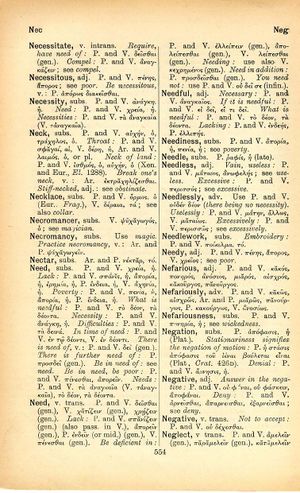negative
From LSJ
ὁ δὲ πείσεται εἰς ἀγαθόν περ → he will obey you to his profit, he will obey you for his own good end
English > Greek (Woodhouse)
adjective
answer in the negative: P. and V. οὐ φάναι, οὐ φάσκειν, ἀποφάναι.
deny: P. and V. ἀρνεῖσθαι, ἀπαρνεῖσθαι, ἐξαρνεῖσθαι; see deny.
verb transitive
not to accept: P. and V. οὐ δέχομαι, δέχεσθαι.
Latin > French (Gaffiot 2016)
nĕgātīvē, (negativus) négativement : Cassiod. Lib. litt. De rhet. arg. 3 ; Boet. Top. Cic. 5.
Latin > German (Georges)
negātīvē, Adv. (negativus), verneinend (Ggstz. affirmative), Cassiod. de dialect. p. 548 (a) ed. Garet. Boëth. in Cic. top. lib. 5. p. 359, 9 B.
Latin > English
negative ADV :: negatively; in the negative (Souter)

